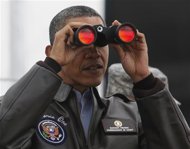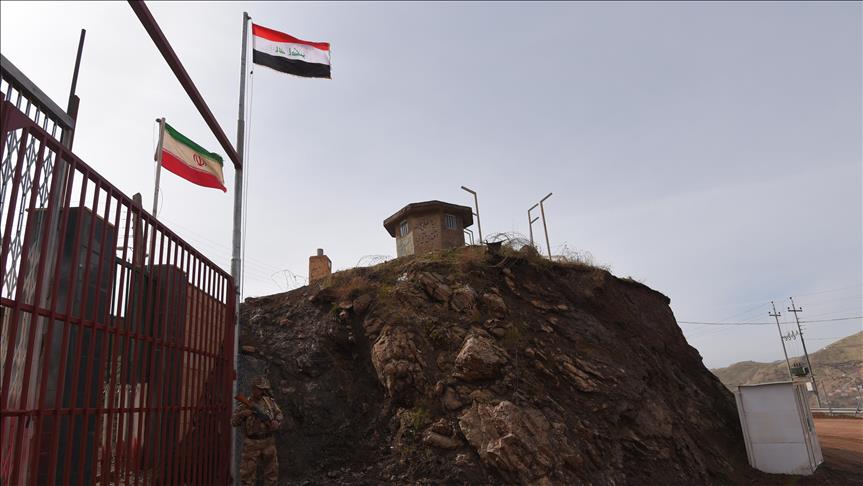President Barack Obama peered across South Korea's tense border with the North on Sunday in a show of solidarity with U.S. ally Seoul and a message of resolve to Pyongyang's new young ruler in his country's nuclear standoff with the West.
Publish dateSunday 25 March 2012 - 09:44
Story Code : 38422
Demilitarized Zone:
Obama scans tense Korean DMZ, North mourns Kim Jong-il
Arriving on the eve of a global summit on nuclear security hosted by South Korea, Obama flew by helicopter to a U.S. base on the edge of the Demilitarized Zone (DMZ) as a solemn North Korea came to a halt to mark the 100th day after "dear leader" Kim Jong-il's death Reuters reported.
"You guys are at freedom's frontier," Obama told about 50 troops crammed into the Camp Bonifas mess at one of the world's most heavily fortified frontiers.
"The contrast between South Korea and North Korea could not be clearer, could not be starker, both in terms of freedom and in terms of prosperity."
He spent about 10 minutes on a viewing platform at the DMZ, talking with some of the soldiers on guard as the flags of the United States, South Korea and the United Nations flapped loudly in the brisk, cold wind.
Obama peered through binoculars from behind bullet-proof glass across to North Korea, pointing at something in the distance. He turned to look at the opposing flags of the two countries being flown on towering masts either side of the DMZ. The North Korean flag flew at half-mast for Kim.
Obama's tour, which followed in the footsteps of White House predecessors and bristled with Cold War symbolism, came amid rising concern over a planned North Korean rocket launch next month that threatens to derail a deal to resume U.S. food aid.
Washington has condemned reclusive and impoverished North Korea's rocket launch plan, which it says will send a satellite into orbit, as a violation of its promise to halt long-range missile launches, nuclear tests and uranium enrichment.
Obama plans to lobby the leaders of China and Russia at the Seoul summit to pressure Pyongyang to stop next month's launch, timed to coincide with big celebrations marking the 100th anniversary of the birth of the state's founder, Kim Il-sung.
South Korea's Yonhap news agency quoted a military official on Sunday as saying the main body of the rocket had been moved to the launch site on North Korea's west coast.
The White House cast Obama's first visit to the DMZ, which has bisected the peninsula since the end of the Korean War in 1953, as a way to showcase the strength of the U.S.-South Korean alliance and thank some of the nearly 30,000 American troops still deployed in South Korea.
Televised images of Obama venturing into the heavily mined DMZ could burnish his commander-in-chief credentials in an election year and help counter Republican accusations that he has not been tough enough on America's foes.
But North Korea's defiance is clouding Obama's much-touted nuclear disarmament agenda, which is also being challenged by Iran's continued nuclear developments in the face of sanctions and international criticism.
NORTH KOREA MOURNS
Obama will join more than 50 other world leaders on Monday for a follow-up to the inaugural nuclear security summit he organized in Washington in 2010 to help combat the threat of nuclear terrorism.
While North Korea and Iran are not on the guest list or the official agenda, they are expected to be the main focus of Obama's array of bilateral meetings on the sidelines of the two-day summit.
Obama's first stop before holding talks with South Korean President Lee Myung-bak was the DMZ, a 4-km (2.5-mile) wide buffer that cuts through the peninsula stretching from coast to coast. Then U.S. president Bill Clinton called it the "scariest place on Earth" during a visit in 1993.
It was drawn up at the end of the 1950-53 civil conflict, which ended in a truce that has yet to be finalized with a permanent peace treaty, leaving the two Koreas in effect still at war.
Obama's visit coincided with the end of the 100-day mourning period for the North's long-time leader, Kim Jong-il, who died in December. Tens of thousands of people crammed into Kim Il-sung Square in central Pyongyang to mark the occasion.
Flags flew at half-mast in "every nook and corner" of the country and sirens and whistles sounded at midday, state media said. North Koreans "overcome with grief" observed three minutes' silence.
The state's new young leader, Kim Jong-un, the third member of the Kim family to rule the state, bowed before a portrait of his father at the palace where he lies in state. He was joined by his uncle, Jang Song-thaek, and military chief Ri Yong-ho.
The young Kim himself made a surprise trip to the DMZ at the start of the month. He looked across the border through binoculars and told troops to "maintain the maximum alertness since (they) stand in confrontation with the enemy at all times".
"You guys are at freedom's frontier," Obama told about 50 troops crammed into the Camp Bonifas mess at one of the world's most heavily fortified frontiers.
"The contrast between South Korea and North Korea could not be clearer, could not be starker, both in terms of freedom and in terms of prosperity."
He spent about 10 minutes on a viewing platform at the DMZ, talking with some of the soldiers on guard as the flags of the United States, South Korea and the United Nations flapped loudly in the brisk, cold wind.
Obama peered through binoculars from behind bullet-proof glass across to North Korea, pointing at something in the distance. He turned to look at the opposing flags of the two countries being flown on towering masts either side of the DMZ. The North Korean flag flew at half-mast for Kim.
Obama's tour, which followed in the footsteps of White House predecessors and bristled with Cold War symbolism, came amid rising concern over a planned North Korean rocket launch next month that threatens to derail a deal to resume U.S. food aid.
Washington has condemned reclusive and impoverished North Korea's rocket launch plan, which it says will send a satellite into orbit, as a violation of its promise to halt long-range missile launches, nuclear tests and uranium enrichment.
Obama plans to lobby the leaders of China and Russia at the Seoul summit to pressure Pyongyang to stop next month's launch, timed to coincide with big celebrations marking the 100th anniversary of the birth of the state's founder, Kim Il-sung.
South Korea's Yonhap news agency quoted a military official on Sunday as saying the main body of the rocket had been moved to the launch site on North Korea's west coast.
The White House cast Obama's first visit to the DMZ, which has bisected the peninsula since the end of the Korean War in 1953, as a way to showcase the strength of the U.S.-South Korean alliance and thank some of the nearly 30,000 American troops still deployed in South Korea.
Televised images of Obama venturing into the heavily mined DMZ could burnish his commander-in-chief credentials in an election year and help counter Republican accusations that he has not been tough enough on America's foes.
But North Korea's defiance is clouding Obama's much-touted nuclear disarmament agenda, which is also being challenged by Iran's continued nuclear developments in the face of sanctions and international criticism.
NORTH KOREA MOURNS
Obama will join more than 50 other world leaders on Monday for a follow-up to the inaugural nuclear security summit he organized in Washington in 2010 to help combat the threat of nuclear terrorism.
While North Korea and Iran are not on the guest list or the official agenda, they are expected to be the main focus of Obama's array of bilateral meetings on the sidelines of the two-day summit.
Obama's first stop before holding talks with South Korean President Lee Myung-bak was the DMZ, a 4-km (2.5-mile) wide buffer that cuts through the peninsula stretching from coast to coast. Then U.S. president Bill Clinton called it the "scariest place on Earth" during a visit in 1993.
It was drawn up at the end of the 1950-53 civil conflict, which ended in a truce that has yet to be finalized with a permanent peace treaty, leaving the two Koreas in effect still at war.
Obama's visit coincided with the end of the 100-day mourning period for the North's long-time leader, Kim Jong-il, who died in December. Tens of thousands of people crammed into Kim Il-sung Square in central Pyongyang to mark the occasion.
Flags flew at half-mast in "every nook and corner" of the country and sirens and whistles sounded at midday, state media said. North Koreans "overcome with grief" observed three minutes' silence.
The state's new young leader, Kim Jong-un, the third member of the Kim family to rule the state, bowed before a portrait of his father at the palace where he lies in state. He was joined by his uncle, Jang Song-thaek, and military chief Ri Yong-ho.
The young Kim himself made a surprise trip to the DMZ at the start of the month. He looked across the border through binoculars and told troops to "maintain the maximum alertness since (they) stand in confrontation with the enemy at all times".
Source : Afghan Voice Agency (AVA), Kabul
avapress.net/vdcauyne.49nau1gtk4.html
Top hits












